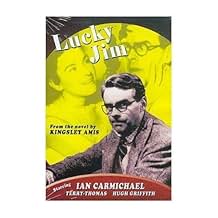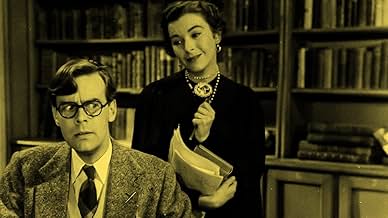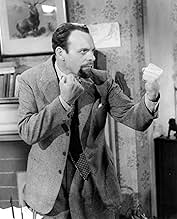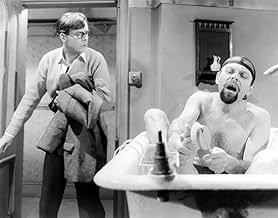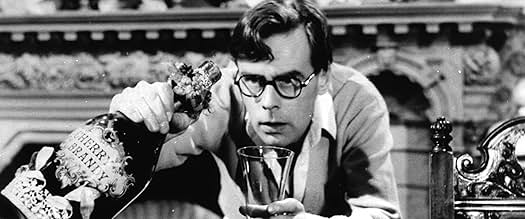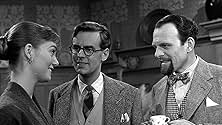Jim Dixon struggles with university work, Professor Welch's boring behavior, and his neurotic friend Margaret Peel. His misery is further complicated by his son Bertrand and companion Christ... Read allJim Dixon struggles with university work, Professor Welch's boring behavior, and his neurotic friend Margaret Peel. His misery is further complicated by his son Bertrand and companion Christine Callaghan.Jim Dixon struggles with university work, Professor Welch's boring behavior, and his neurotic friend Margaret Peel. His misery is further complicated by his son Bertrand and companion Christine Callaghan.
- Director
- Writers
- Stars
John Welsh
- The Principal
- (as John Welch)
Henry B. Longhurst
- Professor Hutchinson
- (as Henry Longhurst)
- Director
- Writers
- All cast & crew
- Production, box office & more at IMDbPro
Featured reviews
Fans of Kingsley Amis's brilliant novel might with justification hate this adaptation, but taken on its own terms, it is an enjoyable slice of 'fifties British comedy. While the novel's bite may have been lost, the movie's troubled production history (a few weeks into the filming, the original director, Ealing's Charles Crichton, was replaced) fails to show on the finished film.
Ian Charmichael is at his best in this movie. The combination of a (realistic) Northern accent, plus a slightly harder edged characterisation, helps distance him from his usual 'silly ass' image. Perhaps he isn't the Dixon of the book, but it is a fair attempt. A first rate cast adds to the fun, in particular a small but perfectly formed cameo by Terry-Thomas steals the movie.
The final chase is, as been noted, the movie's weakest link (it seems to come out of nowhere and does not fit in with the rest of the film) and is it fair from being the best Amiss adaptation (that honour belongs to the wonderful 'Only Two Can Play'). But despite these flaws, it remains a watch able enough movie.
Ian Charmichael is at his best in this movie. The combination of a (realistic) Northern accent, plus a slightly harder edged characterisation, helps distance him from his usual 'silly ass' image. Perhaps he isn't the Dixon of the book, but it is a fair attempt. A first rate cast adds to the fun, in particular a small but perfectly formed cameo by Terry-Thomas steals the movie.
The final chase is, as been noted, the movie's weakest link (it seems to come out of nowhere and does not fit in with the rest of the film) and is it fair from being the best Amiss adaptation (that honour belongs to the wonderful 'Only Two Can Play'). But despite these flaws, it remains a watch able enough movie.
This is an outstanding movie whose meticulously-crafted set pieces frequently had me in stitches. Superbly cast, Ian Carmichael, Hugh Griffiths and Terry-Thomas were in exceptional form, and the luminous beauty of Sharon Acker lights up the film. If you don't find this funny, charming and uplifting, all I can say is that I feel sorry for you!
The pompous, stiff and class-deferential era of the 1950s is marvellously evoked in this movie. Always the sign of a classic, even the minor characters - Mrs Welch, the taxi driver, the waiter and the university porter, for instance - all hold their own and come across as real people. The appalling persona of Bertrand Welch (Terry-Thomas) with his self-obsessed sense of his own importance is excellently drawn. One to see and quite possibly one to keep.
The pompous, stiff and class-deferential era of the 1950s is marvellously evoked in this movie. Always the sign of a classic, even the minor characters - Mrs Welch, the taxi driver, the waiter and the university porter, for instance - all hold their own and come across as real people. The appalling persona of Bertrand Welch (Terry-Thomas) with his self-obsessed sense of his own importance is excellently drawn. One to see and quite possibly one to keep.
I don't think this 1950's Boulting Brothers comedy dramatisation of Kingsley Amis's novel has aged well. It purports to mock upper-class academia of the time through the vessel of Ian Carmichael's title character (cue madrigal singers) as he gently rocks up against his so-called superiors and betters and supposedly knocks them down a peg or two with his freshness, unconventionality and honesty. It's funny how in so doing he comes off himself as a rather eccentric upper-class toff, one who you believe could still end up as one of the stuffy establishment figures he's presumably meant to contrast with.
It doesn't help that Carmichael is much too old in the part. The Angry Young Men were starting to make waves in British theatre and cinema at the time but here all we get a mildly querulous, getting-on-somewhat man blundering and blustering from one unlikely situation to another. The three main comedic set-pieces of Jim (cue madrigal singers) playing in an impromptu musical gathering at his college superior's house, disastrously arranging the floral display of the university procession to be attended by the new college chancellor and lastly his drunkenly irreverent speech on the designated theme of "Merrie England" in front of the assembled pupils and masters all fall flat with the only time I was remotely amused being when in his drunken state he predictably finds himself in the bedroom of his torch-carrying old-maid admirer and proceeds to shoot over the proverbial open goal. Somehow, in all this, he still gets the pretty young girl although the fact that his competition is Terry Thomas in an unsympathetically written-part makes that a foregone conclusion almost from their first meeting.
I see that contemporary critics compared Carmichael's performance as Jim (cue madrigal singers) with that of Jerry Lewis which somehow manages to insult them both. No one else in the cast stood out for me either although they were none of them helped by the dull screenplay and stodgy direction. If this is what passed for rebelliousness in late 50's British cinema, I can only say I'm glad that the so-called kitchen sink dramas with genuinely vibrant young talent like Finney, Harvey, Bates and Courteney were just around the corner.
Oh and those madrigal singers will infuriate you with every chorus!
It doesn't help that Carmichael is much too old in the part. The Angry Young Men were starting to make waves in British theatre and cinema at the time but here all we get a mildly querulous, getting-on-somewhat man blundering and blustering from one unlikely situation to another. The three main comedic set-pieces of Jim (cue madrigal singers) playing in an impromptu musical gathering at his college superior's house, disastrously arranging the floral display of the university procession to be attended by the new college chancellor and lastly his drunkenly irreverent speech on the designated theme of "Merrie England" in front of the assembled pupils and masters all fall flat with the only time I was remotely amused being when in his drunken state he predictably finds himself in the bedroom of his torch-carrying old-maid admirer and proceeds to shoot over the proverbial open goal. Somehow, in all this, he still gets the pretty young girl although the fact that his competition is Terry Thomas in an unsympathetically written-part makes that a foregone conclusion almost from their first meeting.
I see that contemporary critics compared Carmichael's performance as Jim (cue madrigal singers) with that of Jerry Lewis which somehow manages to insult them both. No one else in the cast stood out for me either although they were none of them helped by the dull screenplay and stodgy direction. If this is what passed for rebelliousness in late 50's British cinema, I can only say I'm glad that the so-called kitchen sink dramas with genuinely vibrant young talent like Finney, Harvey, Bates and Courteney were just around the corner.
Oh and those madrigal singers will infuriate you with every chorus!
Jim Dixon works in that most protected of places a redbrick university! However his natural laziness and clumsiness sees him forced to keep in the favour of the dull and absentminded Professor Welch in order to protect his job. With his natural affinity for bad luck, Jim struggles to find a quiet life and a unwanted romance with Margaret (the professor's friend) just make things more difficult. Things get worse when he is put in charge of organising things for the new chancellor but Welch's son arrives in the company of a beautiful young woman, Christine, who Jim finds very attractive but totally unattainable.
With people like the Boutling brothers, Carmichael and Thomas involved I was definitely going to watch this film when they showed it last week as part of the normal cycle of black & white films on daytime TV afternoons, however I must admit not to be entirely won over by this. I have not read the book on which this is based, but I am told that it is a great deal sharper than this film, not a surprise since the film surprised me by having absolutely no satirical edge to it whatsoever and instead seemed to be aiming to be a vague farce. The plot has no sharp edges to it and it only has a very basic sense of humour that involves more pratfalls than witty dialogue and, as a result, I found little here that I actually cared enough about to get into the film. The laughs weren't forthcoming, the plot was rather shallow and uninteresting and the characters were thin.
With all these problems it is no real surprise that even the talent in this cast struggle to make anything of it. Carmichael plays it all too foppish and clumsy and he never really gets a character out of the film. Even Terry Thomas seems unsure of what he is supposed to be doing with this stuff and he doesn't make any memorable impact. Acker is very pretty and Griffith is suitable cast but generally the cast are let down by the material.
Overall this is an average film that doesn't compare to the many better films that the main cast members, producer and director have all done. Usually I would say that any film with these people involved would be worth seeing but unfortunately I can say it about this outing.
With people like the Boutling brothers, Carmichael and Thomas involved I was definitely going to watch this film when they showed it last week as part of the normal cycle of black & white films on daytime TV afternoons, however I must admit not to be entirely won over by this. I have not read the book on which this is based, but I am told that it is a great deal sharper than this film, not a surprise since the film surprised me by having absolutely no satirical edge to it whatsoever and instead seemed to be aiming to be a vague farce. The plot has no sharp edges to it and it only has a very basic sense of humour that involves more pratfalls than witty dialogue and, as a result, I found little here that I actually cared enough about to get into the film. The laughs weren't forthcoming, the plot was rather shallow and uninteresting and the characters were thin.
With all these problems it is no real surprise that even the talent in this cast struggle to make anything of it. Carmichael plays it all too foppish and clumsy and he never really gets a character out of the film. Even Terry Thomas seems unsure of what he is supposed to be doing with this stuff and he doesn't make any memorable impact. Acker is very pretty and Griffith is suitable cast but generally the cast are let down by the material.
Overall this is an average film that doesn't compare to the many better films that the main cast members, producer and director have all done. Usually I would say that any film with these people involved would be worth seeing but unfortunately I can say it about this outing.
Planned as a follow-up to PRIVATE'S PROGRESS (1956), the Boulting Brothers' version of the Kingsley Amis classic substitutes physical comedy for much of the novel's satire. Ian Carmichael plays Jim Dixon as an amiable dolt, well-meaning but hopelessly lost in a faculty world of would-be Oxbridge dons. Professor Welch (Hugh Griffith) comes across as forgetful yet obsessive; his wife (Jean Anderson) as an incorrigible snob; and their son Bertram (Terry-Thomas) as a pretentious layabout. They inhabit a world of the past, dominated by images of 'Merrie England' - an idealized version of history that in Dixon's view never existed. By contrast Dixon tries to inspire his learners by encouraging them to speculate on alternative versions of the past. The film's enduring theme ("Oh, Lucky Jim!") by John Addison offers an ironic counterpoint to many of the protagonists' misadventures; he is clearly NOT lucky in many of the things he does - for example, bringing a bulldog into the Welches' front room to disrupt their evening concert, or creating total anarchy in the middle of a procession dedicated to the new Chancellor's (Clive Morton's) inauguration. Carmichael possesses a certain degree of comic talent as the innocent lost in a world of pseudo-sophisticates, but the Boultings' attempt to turn him into a Keatonesque figure, complete with a repertoire of India-rubber facial expressions, falls rather flat. The film ends happily with Dixon getting the girl (Sharon Acker), but only after a chase-sequence involving a series of unconvincing studio shots that seems out of place in terms of the film as a whole. It's nice to see him get the better of the Welch family, but we don't get the sense that he is in any proud of his grammar school education which (in terms of the novel at least) is particularly important at the time of the film's original release, when redbrick universities were offering greater opportunities to people from all social backgrounds to advance themselves. The Welch family might not like these social upstarts invading their intellectual space but, in terms of British history as a whole, they were the future while the Welches represented the past.
Did you know
- TriviaAt 46 Terry-Thomas was a year older than Hugh Griffith, who played his father. Jean Anderson, playing his mother, was only 4 years older than Thomas.
- GoofsThe taxi used by Jim and Christine when leaving the ball has 'Taxi' on a paper sign in the windscreen which is not there in long shot.
- Crazy creditsOpening credits prologue: A Redbrick University in Britain's new Elizabethan age: here are moulded the intellectual Drakes and Raleighs of tomorrow - fearless, independent - and state supported
- ConnectionsReferenced in The Bill: Lucky Jim (1999)
- How long is Lucky Jim?Powered by Alexa
Details
- Release date
- Country of origin
- Language
- Also known as
- Volltreffer ins Glück
- Filming locations
- The Royal Masonic School, Bushey, Hertfordshire, England, UK(red-brick university where Jim works)
- Production companies
- See more company credits at IMDbPro
- Runtime
- 1h 35m(95 min)
- Color
Contribute to this page
Suggest an edit or add missing content

